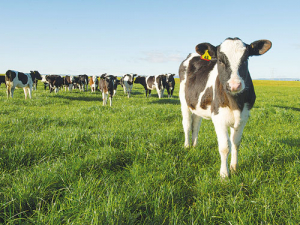With a great deal of enthusiasm and a focus on education, they worked their way up the ladder and soon became renowned for quality. Hicks’ calf-rearing skills are a key component of their success.
Contract milking a herd of 690 cows in the central plateau near Ohakune, on one of the country’s highest altitude farms, is a challenging engagement in a climatically harsh environment that’s probably not too dissimilar to Southland; snow cover in winter, very cold winds and lots of rain are common.
But she wouldn’t have it any other way. She loves the 403ha of the Atihau-Whanganui Incorporation’s AWHI dairy where she runs the milking operation with great skill, infectious enthusiasm and much success.
Thanks to a host of improvements, the first season already brought record production levels and a sight firmly set on best practice and ongoing improvements across all areas. Success is also due to Hicks’ outstanding calf-rearing skills which she has honed over the years and which are in high demand.
Thanks to three full-time and two casual employees she is now able to pass the baton, share her expertise and give back to the farming community. “It’s good to be able to pass on practical knowledge,” she says. “It’s building the industry and supporting the farming community.”
She is a powerhouse in upskilling her peers, be it through her role as a convenor of the Dairy Women’s Network (DWN) or by opening the farm to WWOOFers, students from the Nippon Veterinary and Life Science University in Japan and other volunteers. Unsurprisingly she attracts top-notch farming students.
She champions DWN teaching modules and such events as the SealesWinslow calf rearing day run last year in Feilding.
Such events can improve skill levels and align with Hicks’ focus on quality, evident in her operation, e.g. no cryptosporidium or scouring.
Her calves are well housed, cared for and fed. The SealesWinslow products they eat are “always gone the next day,” she says.
Her approach is tried and proven, she says. The 170-odd calves get colostrum immediately after they’re born “within the golden hour” and with tube assistance if need be.
“We have the necessary manpower on the farm… so we can attend to newborn calves quickly.”
Her feeding regime includes quality colostrum twice a day for two weeks, then once daily. She also adds muesli from day one plus straw. After four weeks she introduces the calves to 20% pellets, then 16% pellets before moving them onto pasture.
Quality is foremost: extensive analysis (rapid pasture meter, rain measurement, tests for herbage, silage, soil, etc), a new in-shed feeding system and carefully documented processes for calf rearers.
A closed Facebook group for staff allows them to communicate issues, discuss solutions and implement them without delay.
After weaning, the calves are moved onto the incorporation’s nearby farm where they weigh in at 100kg and are raised on pasture. From there, they eventually make their way back to Lisa once they’re in calf, starting the cycle afresh.
Farm facts
- 403ha farm at Ohakune
- 690 crossbreed and Friesian cows; about 170 calves
- Pasture: ryegrass and clover, crops (turnips)
- Analysis: tow-behind pasture meter, rain measurement, herbage and silage tests, annual soil tests
- Feed strategy: pasture and some silage; muesli, 20% pellets, 18% pellets, Calflyx, Crystalyx (Easy breather & forage plus). Good uptake without rejection, all-round improvements including weight gain for well-grown heifers.


















